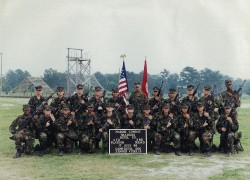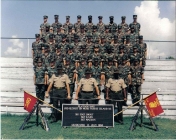Specialty Summary. Manages or performs duties in space operations; space surveillance, space control, missile warning, satellite command and control (C2), or range operations activities. Related DoD Occupational Subgroup: 122100.
Duties and Responsibilities: Detects, identifies, and maintains surveillance on low orbiting and deep space satellite vehicles using optical and radar sensors. Operates space systems to perform space control mission. Detects and tracks sea launched and intercontinental ballistic missiles using a variety of system peculiar sensors. Forwards information to appropriate command and control agencies. Plans satellite contacts, resolves emergencies, and performs satellite commanding during launch, early orbit, daily operations, and end-of-life testing. Performs launch and on-orbit operations for military communications and Global Positioning System satellites. Provides on-orbit telemetry, tracking, and commanding for these and other satellite systems. Performs range operations in support of spacelift and aeronautical testing to fulfill war fighting and national requirements for DoD, NASA, and commercial users. Provides daily command and control expertise at numerous C2 agencies such as the Joint Space Operations Center, regional Air and Space Operations Centers, Space Control Center, National Reconnaissance Operations Center and Missile Correlation Center. Validates and enhances warfighter capabilities through testing and evaluation of space systems. Replicates adversary space capabilities to improve combat training and increase awareness of threats from space.
Specialty Qualifications:
Knowledge. Knowledge is mandatory of the following: Satellite C2 and principles of satellite and ground systems; space warning and control systems; range operations; orbital mechanics; data analysis procedures; sensor theory; data transmission, receiving, recording, and relaying theory; and administrative practices.
Education. For entry into this specialty, completion of high school with courses in physics, geometry, trigonometry, algebra, or computer science is desirable.
Training. For award of AFSC 1C631, completion of an initial skills training course in space systems operations is mandatory.
Experience. The following experience is mandatory for award of the AFSC indicated:
1C651. Qualification in and possession of AFSC 1C631. Also, experience in functions such as C2 systems, telemetry processing, ground systems configuration, mission planning, anomaly resolution, or range operations.
1C671. Qualification in and possession of AFSC 1C651. Also, experience performing or supervising space systems operations functions and activities.
1C691. Qualification in and possession of AFSC 1C671. Also, experience managing space systems operations activities.
Other. The following are mandatory as indicated: For entry, award, and retention of AFSCs 1C611/31/51/71, physical qualification for space operations duty according to AFI 48-123, Medical Examinations and Standards. Specialty requires routine access to Secret material or similar environment. For award and retention of AFSCs 1C6XX, completion of a current National Agency Check, Local Agency Checks and Credit (NACLC) according to AFI 31‑501, Personnel Security Program Management. NOTE: Award of the 3-skill level without a completed NACLC is authorized provided an interim Secret clearance has been granted according to AFI 31-501.




